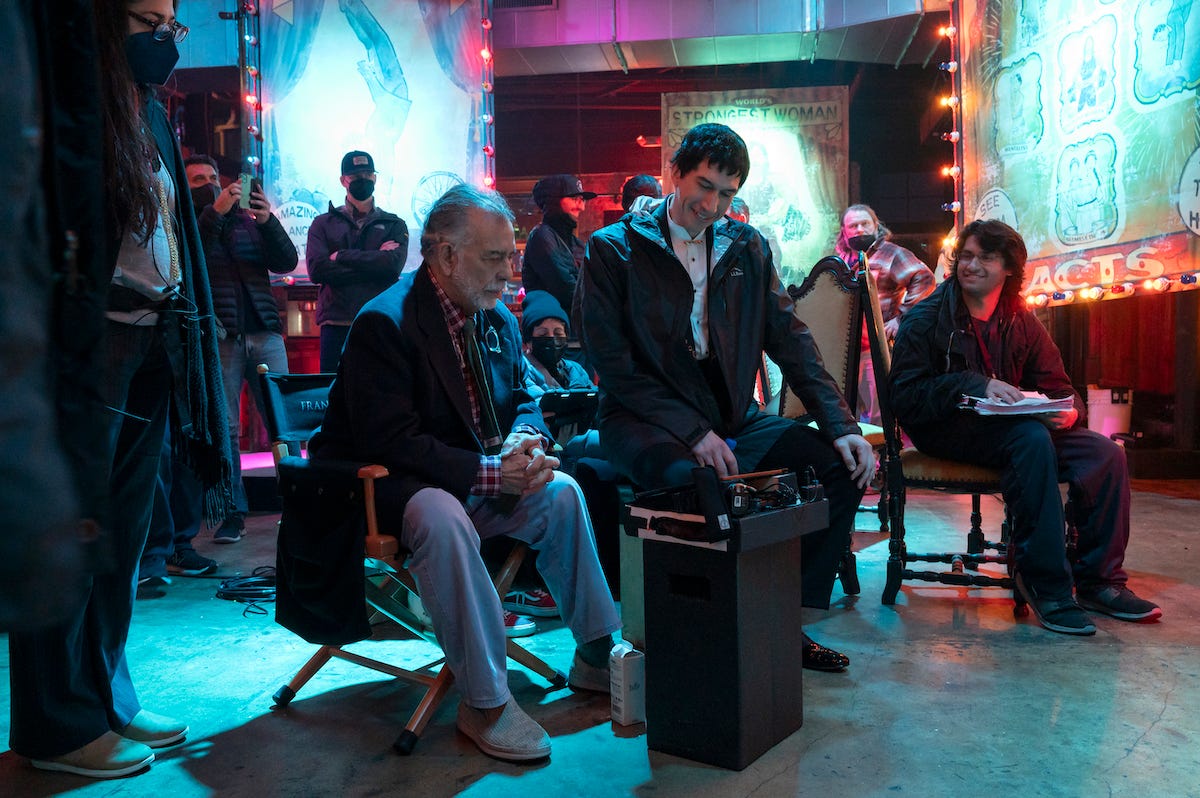This week’s Bulwark Goes to Hollywood is an interview with Bart Weiss, who runs the Ernie Kovacs Award here in Dallas. This year, it’s being awarded to Devo’s Jerry Casale. We had a fun chat, but I want to give you a heads up here and now about the events in Dallas this weekend. On Saturday, Sept. 28, there’s a screening of a Devo documentary at the Texas Theatre at 7:30 p.m.; I’ve seen it, it’s really entertaining and informative, even if you’re not well-versed in Devo lore (which I am not). And the award show itself is Sunday, Sept. 29 at 7:30 p.m. Tickets are available to both! Check them out if you’re here in town! Megalopolis is an act of remarkable hubris: a self-funded cinematic plea for humanity to assert its least-base nature and give itself over to the possibility of utopia. Francis Ford Coppola loves people yet remains wary of the gormless masses, producing a fascinating tension at the heart of the project, a concomitant rejection of populism and desire to aid a populace yearning for something bigger and better. That bigger and better future can only be delivered by Cesar Catilina (Adam Driver), an architect who has not only developed the magical building material megalon, but also serves as an important bureaucrat in the world of New Rome, and has the ability to, ah, stop time. It’s not clear what the point of this time-bending ability is, mind you. But it looks pretty cool when he stops an implosion mid-plosion. And it helps connect him to Julia Cicero (Nathalie Emmanuel), the daughter of the mayor and the only other person who can see him bend time to his will. New Rome, a stand-in for New York City and America writ large, has stultified. It is dying a slow death, one of decadent stagnation: Mayor Franklyn Cicero (Giancarlo Esposito) has no vision beyond common vulgarity, and the wealthy elite is happy to revel in this tasteless excess even while the masses suffer from lack of homes, lack of jobs, lack of vision. Or something, anyway. It’s never really clear what the masses are suffering from, but they’re often on the outskirts of the action looking vaguely sad. Cicero’s dreams are of concrete and steel and casinos, homes and jobs and economic growth, stability in the present at the cost of future excellence. Cesar dreams bigger, and believes that without his hand at the tiller and without the shapeshifting alloy of megalon, all will be lost. And yes, this is all a metaphor. (Or a fable, perhaps, as the film’s subtitle posits.) For American politics, for the film industry, for … everything, all of it. We live in a rut of our own making, one that keeps recycling fashions and intellectual property and musical strains because it’s what the people want. All we need is someone who sees it all to come along and give them something better. All we need is an artist with a vision. Entr’acte Megalopolis is idealistic to a fault, a desperate plea to the people who believe in the power of the arts to let the artists—the architects, the playwrights, the musicians, and, yes, the filmmakers—guide humanity forward. As such, I feel comfortable citing lyrics, just for a moment, just to set the tone. This is from “The Pioneers,” off of Bloc Party’s brilliant 2005 debut album, Silent Alarm: If it can be lost, then it can be won We promised the world we’d tame it The wildness of the world, the desire to tame it through force of will (and projection of force), the belief that time enough is all that’s needed to accomplish our goals, and the danger of what happens if you try and fail: listening to this on an iPod in a cubicle at the Weekly Standard, a few yards away from the closet that housed the Project for a New American Century, “The Pioneers” was a song that hit hard when I heard it in 2006 for … a variety of reasons. Not the least of which is that utopian ideals often spur a furious backlash. Megalopolis will fail, commercially. At least at the box office, the most visible signal for commercial success and failure. This is less a prediction than a fait accompli. Nothing this ambitious can succeed because its success is based on convincing people to see a thing they’ve never experienced before and me telling them to see this thing will do nothing in the face of their buddy who says it looks like garbage. The movie will fail and the nine figures invested in the picture by Coppola will be lost, recouped pennies at a time over decades as the movie finds an audience at home. Or doesn’t. Maybe it fades into the ether like other works of mad genius. And the lesson learned by money men is that ambition is to be avoided, that idealism is weakness, that the masses want their slop and aren’t interested in that which will sustain the cinematic arts into the years ahead. The trade papers will roast the film and its director for their daring indulgence. The gossip mongers will spew bile. The studio heads who spurned the film will knowingly cluck their tongues. The rollercoaster enthusiasts will point to the box office gross—and will once again play the aggrieved victim despite supporting the dominant cinematic mode of our time. All of this was predictable; anyone who has seen Youth Without Youth or Tetro or Twixt likely understood what a $100 million Coppola movie made without any sort of adult supervision might look like and how much appeal that would hold for normie audiences. I joked on Twitter after the final trailer for the film dropped that it looked like Francis Ford Coppola’s Sucker Punch, a reference to the much-loathed Zack Snyder film that I retain an unhealthy amount of admiration for. But that’s almost literally what this movie is: Like Snyder, Coppola was gifted both a tool to visualize the world in any way he saw fit and the budget to realize that vision, and the result is practically experimental. Megalopolis is ethereal and messy with limited concern for little things like “linear storytelling” or “audience understanding.” It is, ultimately, an interesting failure, and an interesting failure remains far worthier of your attention than a successful mediocrity. If Megalopolis serves not as a moment of rebirth for the art of cinema but something closer to its death knell, at least it did so with a murderer’s row of hams chomping down on every bit of set dressing they can get their teeth on. I honestly have a hard time choosing which of the bonkers performances I most enjoyed. Driver has made something of a career out of delivering bonkers performances for aging auteurs: as a Sancho Panza stand-in for Terry Gilliam; as Enzo Ferrari for Michael Mann; and now as Cesar Catilina for Coppola’s decades-in-the-works dream project. Aubrey Plaza’s depiction of Wow Platinum is weirdly timely, given that the character is a CNBC reporter who uses her smoldering sexuality to get the goods and marry rich. When she can’t land Catilina, she instead opts for his insanely wealthy uncle, Crassus, whom Jon Voight plays for an hour with the sort of manic energy he brought to his 10 seconds of screen time as a masticating lunatic on that one episode of Seinfeld. Crassus’s other nephew, Clodio, is played by Shia LaBeouf as a sort of cross-dressing Donald Trump double, rousing the rabble and indulging in populist rhetoric to do … something. The politics of this film are not particularly well thought out; despite Clodio’s villainy, one could easily make the case that it’s a fairly straightforwardly fascist tale about the needs of a brilliant leader to guide the dull masses and the corrupt elite out of the muck in which they wallow and into a brighter future, democracy be damned. I haven’t even mentioned Dustin Hoffman and Jason Schwartzman and Laurence Fishburne and Talia Shire and Kathryn Hunter, all of whom deliver performances at roughly 110 percent of their required wattage. Megalopolis isn’t a good movie, precisely—I think it fails on relatively fundamental levels as both standard storytelling and airy metaphor—but I’m glad it exists and happy to know that the thousands of dollars of Coppola Merlot I’ve consumed over the years helped in some small way to will this unwieldy monstrosity into existence. You’re a free subscriber to Bulwark+. For unfettered access to all our newsletters and ad-free and member-only podcasts, become a paying subscriber. Did you know? You can update your newsletter preferences as often as you like. To update the list of newsletter or alerts you received from The Bulwark, click here. |



